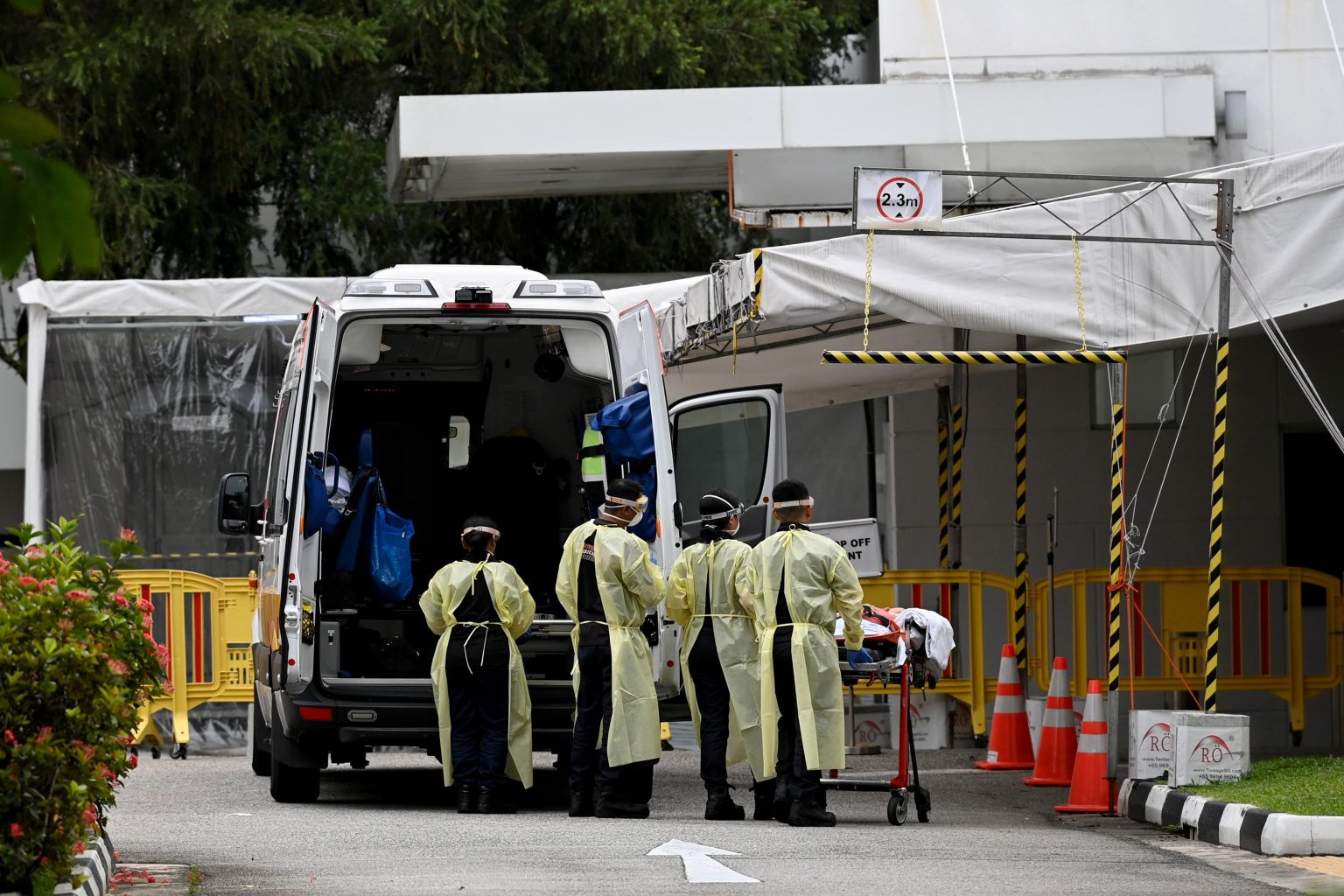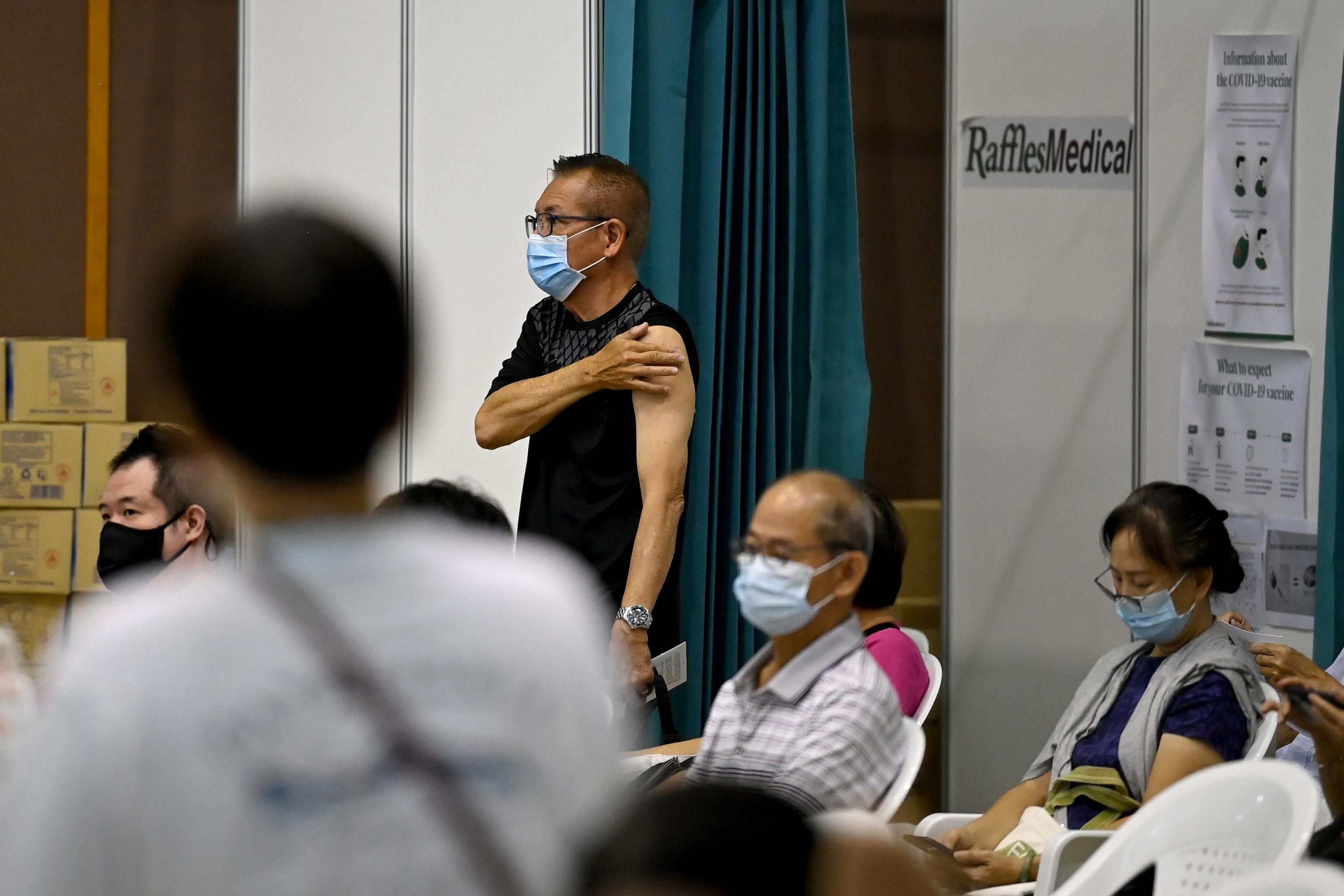Commentary: Tackle factors causing Covid-19 deaths in Singapore
Sign up now: Get ST's newsletters delivered to your inbox

It is critical to ensure that our hospital system can cope with the infections, says Senior Health Correspondent Salma Khalik.
PHOTO: ST FILE
SINGAPORE - It is easy to miss the forest for the trees. This is not surprising, given the amount of data thrown at us - daily infections, deaths, the numbers of the seriously ill and unvaccinated people, the use of the intensive care unit (ICU), seniors who fall ill and those who need oxygen, and so on.
These figures have been used to argue both sides of the issue. Some say they show that it is time for Singapore to ease measures. Others use them to support the argument for even stricter lockdowns, or at the very least, for continuing with current measures.
Unfortunately, the numbers do support both points of views.
So let's take a step back and look at what is truly important.
To me, that is the number of people dying as a result of Covid-19, and the factors influencing this. If the number of deaths can be kept low, then it will be safe for Singapore to relax measures and for life to return to normal.
Protecting healthcare system
It is critical to ensure that our hospital system can cope with the infections. If the number of patients requiring hospital care is manageable, then all patients will be given the best possible care and their chances of recovery are good.
There are several variables here, including how tired our medical professionals must be after more than a year of working under difficult conditions without a break. When exhausted people struggle on, mistakes will happen.
These professionals need a break. That can happen only if there is no surge of patients.
Another is the availability of beds, especially in the ICU, where the critically ill require round-the-clock care.
At the last count, Singapore has ring-fenced 207 ICU beds for Covid-19 patients. Today, there are 64 patients needing such care.
Health Minister Ong Ye Kung gave a much higher number, and he is not wrong. There are another 100-plus seriously ill patients currently in the ICU.
But they are classified in the Ministry of Health's (MOH) situation report as being in the general ward, since their conditions do not require intensive care support. They are likely placed in ICU because there are beds available, and there is the "potential" that they might require ICU care.
But when push comes to shove, there are more than 150 Covid-19 ICU beds available.
So why has the MOH put aside so many ICU beds when most are not needed? The answer is simply that ICU beds can fill up quickly should there be a surge in seriously ill patients.
Patients in ICU are generally there for a fortnight, though some might require such care for a month or more. So if more patients are admitted than discharged, the beds will fill up, and this is what the multi-ministry task force tackling Covid-19 fears.
Importance of vaccination
Another factor in play is the vaccination rate among people 12 years and older, since vaccine protection has been proven beyond doubt. If the entire eligible population is vaccinated, the spread of the disease will be slower, and fewer would suffer severe illness and death.
Unvaccinated people who get infected are using healthcare facilities and dying in disproportionately high numbers.
Mr Ong said on Saturday: "We have a group of seniors who are still unvaccinated. They account for 1.5 per cent or slightly less, of the total population, and over the last 28 days, accounted for two-thirds of ICU occupancy and deaths."
For unvaccinated seniors aged 60 and older, data shows that one in four infected will require oxygen, ICU care or will succumb.
Two in three of the more than 200 people who have died of Covid-19 this month were either not vaccinated or only partially vaccinated. Most, though not all, were aged 60 years and older.
If these 68,000 seniors were to get vaccinated, the number of people who are seriously ill, as well as the number dying every day, will fall significantly. Medically, there is no reason why most of them can't get vaccinated.
Said Professor Dale Fisher, a senior infectious diseases consultant at the National University Hospital (NUH): "If everyone over 60 was vaccinated, we would be easing restrictions much faster. Our opening is held back by the threat to hospital capacity and this is largely being utilised now by a small percentage of the population - the unvaccinated."
Associate Professor Hsu Li Yang, an infectious diseases expert at the NUS Saw Swee Hock School of Public Health, said that the benefits of vaccination are stark in those aged 50 years and older. "There is an over tenfold lower risk of severe illness and death in those who are fully vaccinated versus those who are unvaccinated or partially vaccinated."

People are seen at the vaccination centre at Sengkang Community Club on Oct 1, 2021.
ST PHOTO: LIM YAOHUI
The Government has said it would not mandate the vaccine as it has received only fast-lane approval for use during the pandemic, and not the usual full approval.
Instead, it is using persuasion, as well as discrimination - the latest being employers can sack workers who are not vaccinated - to try to push more people to get vaccinated.
Prof Fisher is a strong supporter of mandating vaccines for older people. He said: "We mandate seat belts, voting and many other important factors in our lives and no one complains."
But Prof Hsu said mandating vaccines for everyone has trade-offs as it will "generate much resentment and pushback even in Singapore", but it would be more acceptable if the mandate is limited to those at high risk, such as seniors.
He said doing so could prevent several hundred deaths.
After half a year of persuasion, 9 per cent of people aged 70 years and older remain unvaccinated. However, this is a far cry from the more than 20 per cent of people in this age group not vaccinated in early August.
Hopefully, more among them will come forward to be vaccinated soon.
Vaccination rates are higher in younger people - 93 per cent in those aged 12-39 and 95 per in those 40-69 years old.
Vaccination should also be encouraged in people who have recovered from Covid-19, since protection from an infection is not lifelong.
An article in the prestigious Nature journal on Oct 19 said: "People who have been infected with Sars-CoV-2 can expect to become reinfected within one or two years, unless they take precautions such as getting vaccinated and wearing masks."
The article was based on modelling data by the Yale School of Public Health.
It found that "the average reinfection risk rises from about 5 per cent, four months after initial infection, to 50 per cent by 17 months".
Vaccinated seniors
There is little we can do about Singapore's ageing population. Age is a major risk factor, not just for Covid-19, but for most diseases, and so we see deaths among those who have been fully vaccinated.
According to the MOH, almost all fully vaccinated people who have died of Covid-19 have underlying medical conditions.
A clearer understanding of what is meant by underlying medical conditions that contributed to Covid-19 deaths would be useful.
Does it refer to well-controlled high blood pressure, high cholesterol level and diabetes? Or are they more serious conditions such as heart failure? Does a cancer survivor face higher risk of severe illness and death if infected?
It would help to know, since there are probably over a million people here with some underlying medical conditions. Are they all at equal risk?
It would also be enlightening to know, among those who were vaccinated and died, how long ago they had received their second shot. And if any had already gone for their booster shot.
If boosters really provide added protection, it would give a level of confidence to people with underlying medical conditions that when the measures here are relaxed, they continue to remain protected.
But we must also accept that even if the entire population has been vaccinated, and given booster shots, the virus will still spread and people will still die. Hopefully, the numbers will remain small.
Singapore has close to 60 Covid-19 deaths per million population. About 80 countries have had more than 1,000 deaths per million population, with deaths in the six worst-hit countries topping 3,000 per million population.
Over the past couple of months, Singapore has been facing a surge in community cases that most countries had last year. Delaying this wave till more than 80 per cent of the population has vaccine protection is a major reason for the lower number of deaths.
Hopefully, the booster shots for people 30 years and older, as well as more older people getting vaccinated, will continue to keep infections and deaths low.


